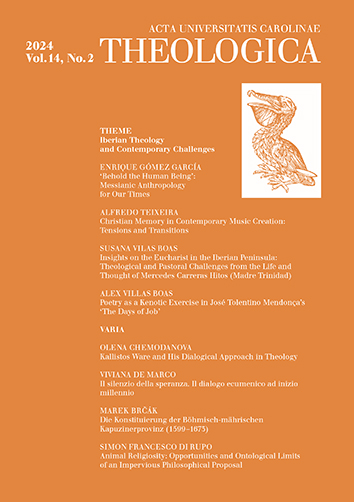AUC Theologica is a peer-reviewed journal for theology published twice a year. As we publish original papers in English, German, French, and Italian, our mission is to serve as a platform both for Czech researchers, who can present their research results in these languages, and for international contributors, who are invited to enter the academic theological discussion in the heart of Europe.
The journal focuses on a wide range of theological disciplines, such as systematic theology, biblical studies, patristic studies, pastoral and spiritual theology, religious education, church history, etc. Within these fields, the journal seeks to reflect the current theological questions and problems, which often requires interdisciplinary approaches. Supporting the intersection of various theological disciplines, we thus also welcome theological papers touching other academic fields including philosophy, sociology, literary studies, and science.
Each issue consists of two sections. The thematic section presents papers of the same focus. The section called ‘Varia’ invites papers dealing with various theological themes from the perspective of all Christian traditions. Our current and past issues are approachable for free on this website in the form of Open Access.
AUC THEOLOGICA, Vol 1 No 1 (2011), 53–66
„Křesťan je především člověk jako každý jiný…“, aneb koncept autonomní morálky v kontextu křesťanské víry Alfonse Auera
[“A Christian is first of all a man just as any other man…” or Alfons Auer’s Concept of Autonomous Morality in the Context of Christian Faith]
Jaroslav Lorman
DOI: https://doi.org/10.14712/23363398.2015.60
published online: 26. 06. 2020
abstract
The text reminds us of the infl uential concept of the so-called autonomous morality in the context of Christian faith, which has not been suffi ciently refl ected in Czech catholic theology so far. Alfons Auer (1915–2005), a German moral theologian, is considered to be the author of the concept, which he further elaborated in reaction to the publication of Paul VI’s encyclical Humanae vitae (1968). Auer approaches the questions about the specifi cally theological aspect of Christian morality from the standpoint of philosophical realism; moral theology is predominantly meant in its normative dimension, traditionally based on the theoretical-instructional model of revelation. The fundamental statement of the concept of autonomous morality in the Christian context is that practical reason suffi ces to correctly deduce moral requirements from the order of reality. An authority which would impose moral requirements from the outside and also control them must respect this, even if it were a church authority. Its primary fi eld of interest is the specifi cally Christian conduct, which Auer calls the ethos of salvation (Heilsethos) and which can be roughly defi ned by the commandments of the fi rst table of the Decalogue. The moral requirement which results from the understanding of the sphere of “profane” reality (Weltethos) can be correctly recognized in the light of the communicated reason of every person. On the tradition of biblical texts as well as on the history of Christian theology, Auer demonstrates that God’s people have always been open towards the outside world, whose intellectual and ethical concepts they have critically embraced. A specifi cally Christian approach to the recognized requirements of the secular ethos consists in subjecting them to criticism, integrating all that is acceptable and stimulation in the overall horizon of faith. The concept of autonomous morality has been the topic of a fi ery debate since the 1970s.
keywords: theological ethics; autonomous morality in the Christian context; moral theology

„Křesťan je především člověk jako každý jiný…“, aneb koncept autonomní morálky v kontextu křesťanské víry Alfonse Auera is licensed under a Creative Commons Attribution 4.0 International License.
148 x 210 mm
periodicity: 2 x per year
print price: 100 czk
ISSN: 1804-5588
E-ISSN: 2336-3398
